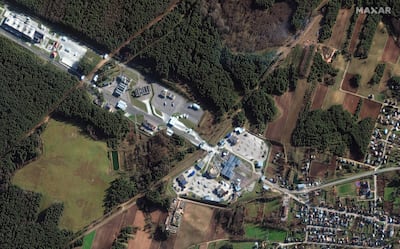High-quality satellite images have shown the desperate situation at the Belarus-Poland border as thousands of migrants try to enter the European Union.
They are camped near the Kuznica border crossing on the Belarus side as Polish security forces monitor the situation from the other side.
The aerial images, taken from a Maxar Technologies satellite, show migrants trying to enter EU territory, from where travel between bloc members becomes easier. They can be seen lining the road, near the forests where many have made their makeshift camps.
They have been gathering for months but numbers have escalated in the past week, as has the political rhetoric between the two sides.
The stand-off took on a larger scope this week as a large group of asylum seekers, most of them from the Middle East, arrived at the border. Some tried to force their way across and hundreds, possibly thousands, remain in makeshift camps in freezing temperatures, deepening humanitarian concerns.
Poland has objected since the summer to the increasing number of refugees and migrants trying to enter the country and the EU accuses the Belarus regime of encouraging illegal migration to create instability in the West.
Concern was growing for more than 2,000 migrants – mainly Kurds from the Middle East – who are trapped at the border, with the UN Security Council to hold an emergency meeting on Thursday over the issue.
Western governments accuse Belarusian President Alexander Lukashenko of luring them to his country and sending them to cross into EU and Nato member Poland in retaliation for EU sanctions imposed upon his country.
Mr Lukashenko said on Thursday he needed Russian nuclear-capable bombers to help him deal with the migrant crisis after two Russian Tu-160 planes rehearsed bombing runs in a training exercise.
It was the second day running that Russia had sent bombers to fly over Belarus in a show of support for its close ally Minsk, which the EU has accused of mounting a "hybrid attack" by pushing migrants from the Middle East, Afghanistan and Africa across the border into Poland.
"We have to constantly monitor the situation at the border. Let them squeak, let them shout. Yes, these are bombers capable of carrying nuclear weapons. But we have no other option. We must see what they are doing there beyond the borders," Mr Lukashenko said.
Dmitry Peskov, spokesman for Russian President Vladimir Putin, said Russia was putting its efforts into resolving the crisis.

On Thursday, three EU nations — two of them bordering Belarus — “unequivocally condemn[ed] the deliberate escalation”, while Belarus warned gas supplies into Europe could be cut off.
Migrants stranded inside Belarus threw rocks and branches at Polish border guards and used logs to try to break down a razor-wire fence. They are enduring freezing weather in makeshift camps.
Bartosz Grodecki, a deputy interior minister, said in an interview with the Polsat broadcaster on Thursday morning that there were more attempted crossings overnight, including one involving a group of 150.
Grodecki said Polish authorities expect another forceful attempt to enter the country on Thursday night. A large number of the police officers assigned to guard an Independence March in Warsaw will be sent to the border after the rally, he said.
Many of the migrants dream of ending up in Germany, France, Scandinavia — or even the UK on the western side of Europe rather than Poland or Lithuania.
Lithuania is experiencing similar problems to Poland in what the EU calls the "weaponisation" of migrants.
In a joint statement on Thursday, the defence ministers of Lithuania, Latvia and Estonia said they saw the crisis as “very alarming", and they condemned "the deliberate escalation of the continuing hybrid attack by the Belarusian regime, which is posing serious threats to European security”.
“Large groups of people are being gathered and transported to the border area, where they are then forced to illegally cross the border. This increases the possibility of provocation and serious incidents that could also spill over into military domain,” they said.
The bloc accuses Mr Lukashenko of manufacturing the migrant crisis in revenge for sanctions after a violent repression of mass street protests against his rule.
He threatened on Thursday to retaliate against any new EU sanctions, including by shutting down the transit of natural gas and goods through Belarus.
“If they impose additional sanctions on us … we must respond,” Mr Lukashenko told Belta state news agency.
“We are heating Europe, they are still threatening us that they will close the border. And if we shut off natural gas there? Therefore, I would recommend that the Polish leadership, Lithuanians and other headless people think before speaking,” he said.
Belarus also condemned Poland’s military build-up on their mutual border, saying migration control did not warrant the concentration of 15,000 troops backed by tanks, air defence assets and other weapons.
“It looks more like forming a strike group of forces. The actions of the Polish military goes against all the international and bilateral agreements,” said Oleg Voinov, head of department of international military cooperation of Belarusian Defence Ministry.
Polish politicians introduced a state of emergency and changed the country’s asylum laws.
Only troops have access to the border area, to the dismay of refugee agencies and Poland’s EU partners. Lithuania is taking similar measures and has begun extending its border fence.










